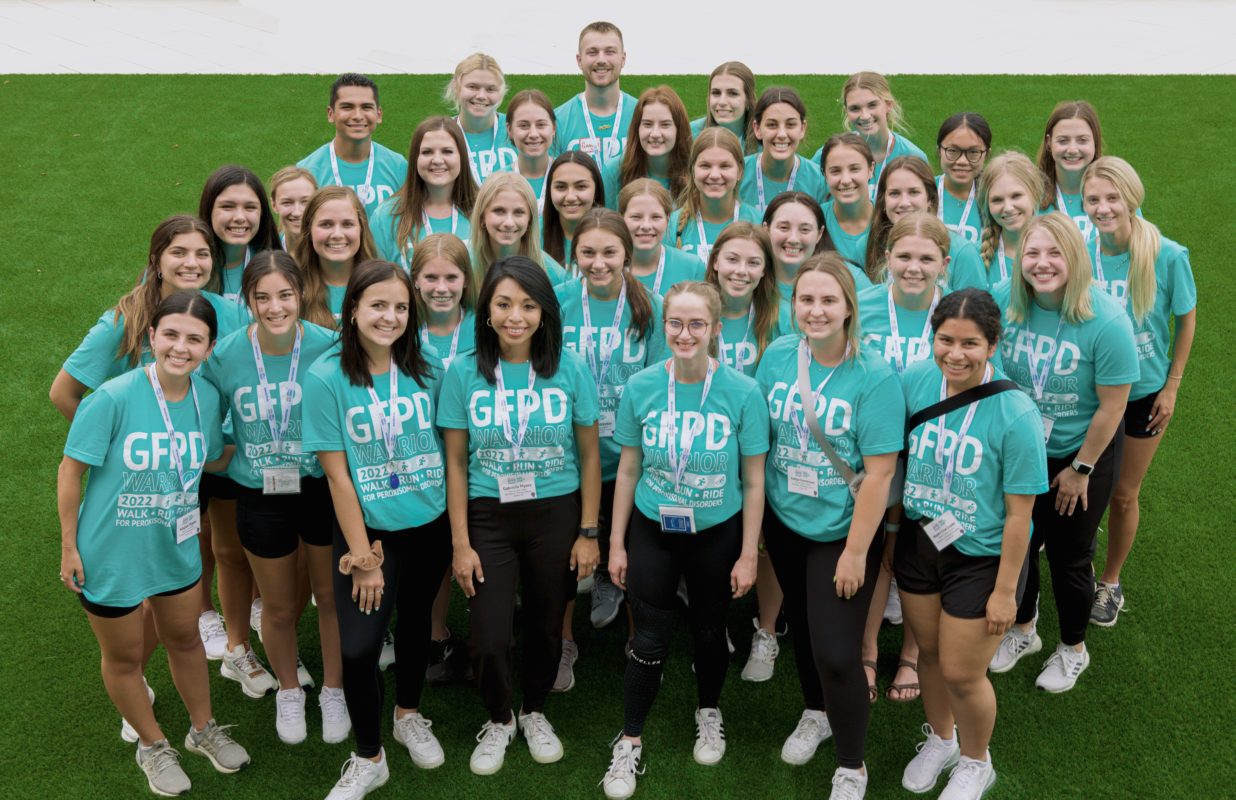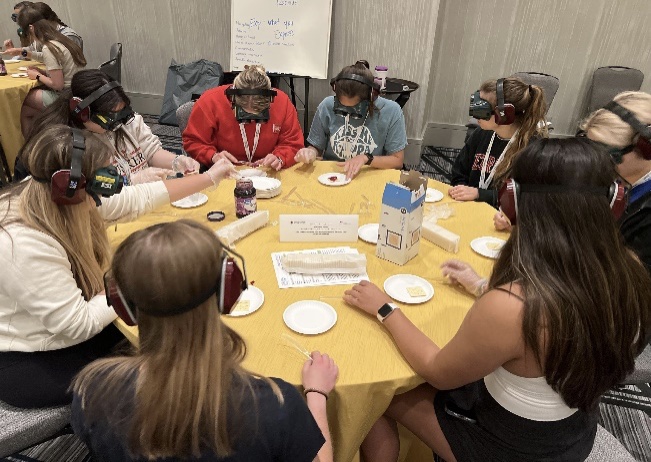GFPD Fellowships
2024 GFPD Fellowship Applications Are Closed.
The Global Foundation for Peroxisomal Disorders has long championed research along with family programming and advocacy. Over the past 13 years, the GFPD has instituted a number of programs to build capacity in both science and practice, leading to comprehensive fellowship programs that impact our Warriors, families, scientific researchers and medical providers.
Warrior Camp Fellow Program
Applications are now closed.
One of the largest fellowship programs at the GFPD is our Warrior Camp Fellowship Program. This intensive training and practice program assembles a team of more than three dozen volunteer fellows to oversee four days of hands-on, experiential learning and activity for GFPD Warriors, their siblings and other children attending each conference.
The 2024 GFPD Family and Scientific Conference will be held in Washington, D.C. May 26-29, 2024. Applications for the 2024 Fellowship are now closed.
Frequently Asked Questions:
Who can apply for the GFPD Warrior Camp Fellowship?
- The GFPD Warrior Camp Fellowship is open to US residents 18 years of age or older. Fellows are often studying or working in fields where they may directly interact with rare diseases, including, but not limited to, healthcare and education.
What is the time commitment for the GFPD Warrior Camp Fellowship?
- The GFPD Warrior Camp Fellowship lasts approximately 4 months, including virtual training and 6 days on-site at the GFPD Family & Scientific Conference. Applicants for the 2024 fellowship must be available to be on-site in Washington, D.C. from May 24th – May 30th.
What costs should GFPD Warrior Camp Fellows expect?
- The GFPD covers training, travel, lodging, conference meals, and materials needed for the completion of the fellowship. We are always looking for conference sponsorships, grants, and fundraisers to help support fellow costs, and may ask fellows for their input. Any off-site activities fellows choose to do in their free time are not covered by the GFPD.
What does a typical day at the GFPD Conference look like for a Warrior Camp Fellow?
- Fellows may be assigned a variety of different tasks while at the conference, but most time will be spent in Warrior Camp. Fellows will have the opportunity to engage with participants throughout Warrior Camp, and schedules will be completed to maximize the learning opportunities for fellows.
Do I need any special training to be considered for a GFPD Warrior Camp Fellowship?
- Fellows will be trained by GFPD team members and a variety of professionals.. Prior to the conference, self- study modules, as well as remote meetings/panels will occur. In-person training, including deaf-blind simulation and setting up environments for deafblind learners will be provided.. While CPR/First Aid is beneficial, it is not required.
What training do Warrior Camp Fellows receive?
- Each Warrior Camp Fellow receives more than 30 hours of training through a multi-faceted orientation that includes a Deaf-Blind simulation, techniques for engagement with individuals with multi-sensory impairments, and understanding of peroxisomal disorders.
- As they learn alongside various experts, Fellows also gain hands on experience in the following: multi-sensory loss, multiple disabilities, multi-system diseases, the impact of a rare disease diagnosis on the family unit, how to engage with families while experiencing different family dynamics, and learning the importance of inter-professional practice and teaming, building professional networks and resources
How do I apply for a GFPD Warrior Camp Fellowship?
- Applications are now closed
Can you apply for the GFPD Warrior Camp Fellowship more than once?
- Absolutely! We encourage anyone who is interested and available to apply for the fellowship. Applicants can be accepted into the program more than once. Previous completion of the program does not guarantee future acceptance as everyone must follow the same application process.
Who can I contact if I have more questions about the GFPD Warrior Camp Fellowship? Please contact Abby Pelster, GFPD Community Engagement Coordinator, at abby@thegfpd.org for more information.
The 2024 GFPD Conference Medical and Scientific Fellowship for Early-Stage Investigators and Young Scientists
Applications are now closed.
The Global Foundation for Peroxisomal Disorders invites professionals to join us at our 2024 Family Conference in Washington, D.C., May 26-29. We have designed a robust fellowship to engage professionals in learning and networking opportunities as we convene a diverse group of patients, families, caregivers, medical and scientific professionals, allied health professionals, care providers and rare disease advocates. The GFPD will underwrite the travel and lodging for up to 15 conference fellows.
WHO This fellowship is designed for:
- Medical Students
- Medical Residents
- Physicians (primary care and specialty)
- Advanced practice nurses and physician assistants
- Genetic counselors
- Allied health practitioners (speech language pathologists, physical and occupational therapists, etc.)
- Public and Community Health Professionals
- Researchers and scientists
- Doctoral and masters level students in research
WHAT Some of the activities and learning opportunities include:
- Four days of attendance at the 2024 Family Conference with families, doctors, scientists, caregivers, and other professionals including specific workshops addressing medical and scientific initiatives
- Pre-Conference learning on rare diseases and peroxisomal disorders, health literacy for caregivers and professionals, how social determinants of health affect rare disease patients, DEI initiatives in the rare disease space, and the network of various opportunities for professionals interested in rare diseases
- Observation of our Externally Led-Patient Focused Drug Development meeting with the Food and Drug Administration (FDA)
- Observation and participation in Professional Pop-ins with patients, families, caregivers while they meet with physicians, scientists and professionals
WHY The GFPD is committed to amplifying the work of professionals in the rare disease space, developing a workforce necessary to treat patients and prepare the population for clinical trials. Additionally, The GFPD is committed to increasing the knowledge and health literacy for all involved in rare diseases and peroxisomal disorders from patients and caregivers to physicians, scientists and other professionals.
THE DETAILS The GFPD has a limited number of fellowships (travel and lodging assistance) available for the 2024 Family and Scientific Conference thanks to the generosity of donors and our board of directors. We have 15 openings for physicians (including medical residents), medical students, research scientists, students, public health professionals, and other allied health professionals including genetic counselors, speech language pathologists, physical and occupational therapists and more.
The application is simple. Please upload a letter of interest with your CV or resume to this link: https://forms.gle/nAPvKSZVcb1PDthAA
CV/ resumes and letters of interest will be reviewed by Daniel Billingsley, Ph.D., GFPD Scientific Liaison and Melissa Bryce, GFPD Executive Director.
In your letter, please include why you want to learn more about rare diseases and peroxisomal disorders specifically, what you hope to learn at the conference and how you will take your learning and put it into practice.
Fellows accepted will attend two 60-minute educational sessions via zoom prior to the conference and will be asked to produce a report for publication on the GFPD website/blog four weeks following the event as well as complete a post-attendance survey and interview.



2022 GFPD Warrior Camp Fellows

Abbey Dyer, Communication Sciences & Disorders, University of Nebraska – Lincoln
Avae’ Muir, Communication Sciences & Disorders, University of Nebraska – Lincoln
Bailey Jones, Communication Sciences & Disorders, University of Nebraska – Lincoln
Bridget Slagle, Communication Disorders, University of Nebraska – Kearney
Charlotte Griffith, Communication Disorders, University of Nebraska – Kearney
Claire Kubicek, Communication Sciences & Disorders, University of Nebraska – Lincoln
Claire Streeter, Communication Sciences & Disorders, University of Nebraska – Lincoln
Eddio Benitez, Nursing, University of North Carolina
Elizabeth Lamb, Communication Sciences & Disorders, University of Nebraska – Lincoln
Elizabeth Wheeler, Communication Sciences & Disorders, University of Nebraska – Lincoln
Estrella Uribe, Communication Sciences & Disorders, University of Nebraska – Lincoln
Gabriela Myers, Communication Disorders, University of Nebraska – Kearney
Garrett Schliep, Pre-Occupational Therapy, University of Nebraska – Omaha
Holly Rockenbach, Communication Disorders, University of Nebraska – Kearney
Jadyn Cattau, Pre-Occupational Therapy, University of Nebraska – Lincoln
Jessica Leung, Communication Sciences & Disorders, University of Nebraska – Lincoln
Kaitlyn Hutchinson, Special Education, University of Nebraska – Lincoln
Karissa Boesiger, Communication Sciences & Disorders, University of Nebraska – Lincoln
Kaylee Flynn, Communication Sciences & Disorders, University of Nebraska – Lincoln
Lizabeth Larsen, Communication Sciences & Disorders, University of Nebraska – Lincoln
Logan Bennett, Communication Sciences & Disorders, University of Nebraska – Lincoln
Madison Han, Pre-Medicine, University of Nebraska Medical Center
Maggie Keslar, Communication Sciences & Disorders, University of Nebraska – Lincoln
Nayeli Cruz Lopez, Communication Disorders, University of Nebraska – Kearney
Nyah Thaemert, Communication Sciences & Disorders, University of Nebraska – Lincoln
Rachel Anderson, Pre-Occupational Therapy, University of Nebraska – Lincoln
Sarah Frett, Pre-Occupational Therapy, University of Nebraska – Lincoln
Rylie Riepl, Communication Sciences & Disorders, University of Nebraska – Lincoln
Sarah Mahnesmith, Communication Sciences & Disorders, Butler University
Shelby Neiman, Communication Sciences & Disorders, University of Nebraska – Lincoln
Sheyla Fierro, Communication Sciences & Disorders, University of Nebraska – Lincoln
Sydney Hobza, Communication Sciences & Disorders, University of Nebraska – Lincoln
Sydney Huls, Communication Sciences & Disorders, University of Nebraska – Lincoln
Tatum Cool, Communication Sciences & Disorders, University of Nebraska – Lincoln
Victoria Bailey, Communication Sciences & Disorders, University of Nebraska – Lincoln
Hailey Koenig, Communication Sciences & Disorders, University of Nebraska – Lincoln
